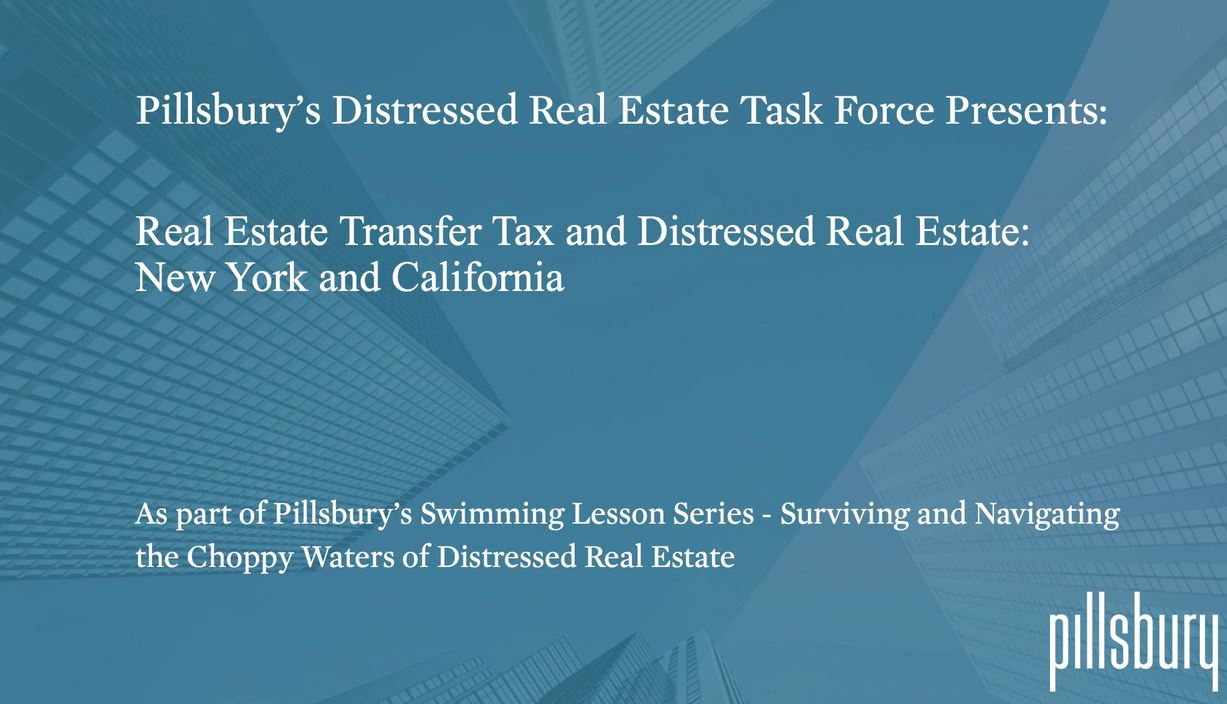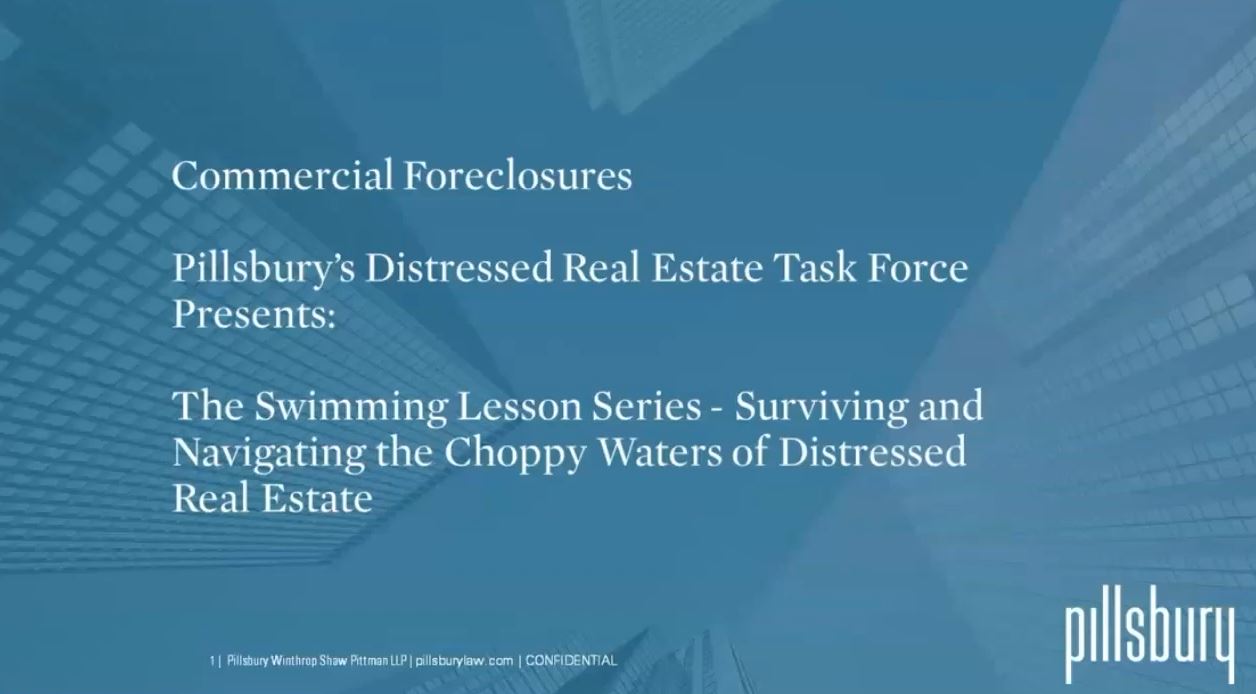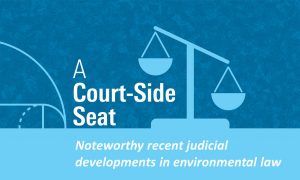 Legislation signed into law on December 27, 2020, fixed the rate for the 30% present value low-income housing tax credit (LIHTC), which had dropped to a historic low of 3.07 in 2020, at 4% (the 4% Floor). Congress hopes that the 4% Floor will increase the supply of affordable rental housing in 2021 and beyond by reducing the need for other types of financing and subsidies for qualified LIHTC projects.
Legislation signed into law on December 27, 2020, fixed the rate for the 30% present value low-income housing tax credit (LIHTC), which had dropped to a historic low of 3.07 in 2020, at 4% (the 4% Floor). Congress hopes that the 4% Floor will increase the supply of affordable rental housing in 2021 and beyond by reducing the need for other types of financing and subsidies for qualified LIHTC projects.
Swimming Lessons–Surviving and Navigating the Choppy Waters of Distressed Real Estate

Real Estate partner Andrew Weiner and Tax partner Craig Becker discuss the intersection of transfer tax with enforcement in distressed real estate in New York and California in the latest Swimming Lessons Series presentation.
A Court-Side Seat: “Inholdings” Upheld, a Pecos Bill Come Due and Agency Actions Abound
Here are some significant environmental and regulatory rulings and administrative actions from December 2020.
Extended Rent Holiday for Retail Debtors Not Permitted Under Bankruptcy Code
A recent Chuck E. Cheese decision denies the debtor’s/tenant’s request to defer paying rent after th e 60-day “rent holiday.” The Bankruptcy Court applied the “plain language” rule to hold that section 365(d)(3)’s rent holiday cannot be extended. In “Bankruptcy Court Rules Bankruptcy Code Does Not Permit Extended Rent Holiday for Retail Debtors” colleagues, Patrick J. Potter, Patrick E. Fitzmaurice, and Kwame O. Akuffo discuss that after that initial 60-day period expires, the debtor is required to pay post-petition rent. The court did not order the debtor to make a rent payment on the 61st day and deferred ruling on landlord remedies for tenants failing to pay post-petition rent, regardless of when the rent accrued.
e 60-day “rent holiday.” The Bankruptcy Court applied the “plain language” rule to hold that section 365(d)(3)’s rent holiday cannot be extended. In “Bankruptcy Court Rules Bankruptcy Code Does Not Permit Extended Rent Holiday for Retail Debtors” colleagues, Patrick J. Potter, Patrick E. Fitzmaurice, and Kwame O. Akuffo discuss that after that initial 60-day period expires, the debtor is required to pay post-petition rent. The court did not order the debtor to make a rent payment on the 61st day and deferred ruling on landlord remedies for tenants failing to pay post-petition rent, regardless of when the rent accrued.
The G2G Year in Review: 2020
As we say goodbye to 2020, we wanted to share our top five most-read articles of 2020 from Gravel2Gavel. The most-read blog posts covered real estate and construction industry trends ranging from proptech trends like blockchain tokenization to COVID-specific rent carveouts and management disclosures to trends and market updates. Our posts provided deep industry insight and summarized hot topics that addressed the legal implications and disruptions that affected the market. Our 2020 roundup:
- Blockchain-Based Tokenization of Commercial Real Estate by Matt Olhausen. Matt discusses the increasing interest in technology applications for real estate assets, or “Proptech,” and tokenization’s potential.
- Real Estate Trends: Looking Ahead to 2021 by Adam Weaver. Adam discussed the pandemic’s influence and future trends for the real estate market.
- Management’s Duties and Responsibilities to Disclose COVID-19 Cases to Commercial and Residential Tenants While Also Protecting Privacy by Rebecca Carr Rizzo. Rebecca discussed how timely and accurate disclosures of positive COVID-19 results could reduce liability.
- Real Estate Market Update. Joel Simon discusses the current real estate market, the types of lenders active in the market, and popular transaction types that thrived in 2020.
- The Looming Housing Crisis and Limited Government Relief—An Examination of the CDC Eviction Moratorium Two Months In. Zach discussed the federal eviction moratorium.
A Court-Side Seat: Appeals and Agency Developments at the Close of 2020
THE FEDERAL APPELLATE COURTS
The U.S. Court of Appeals
On November 23, 2020, the court, in a 2-to-1 vote, rejected the plaintiff’s request for an emergency injunction pending appeal in the case of Manzanita Band of Kumeyaay Nation, et al. v. Wolf. The majority held the requirement for such relief did not meet the requirements set forth in Winter v. NRDC, 555 US 7 (2008). Here, the plaintiffs allege that that the government’s construction of a border wall violates several environmental laws that were illegally waived by the Secretary of the Interior. Judge Millett dissented in part because the plaintiffs demonstrated a likelihood of success on the merits. She pointed to the argument that the authority of the Secretary—or Acting Secretary—to take these actions has been successfully challenged in several federal district courts. An expedited pleading schedule was established by the court.
Real Estate & Hospitality Podcast Roundup
We’ve been busy podcasting! Here are some of our recent episodes focused on real estate and hospitality (and hosted by Joel Simon).

Episode #22: Real Estate Market Update: Listen in for an update on the current real estate market, which types of lenders are active in the market and the popular transaction types that are thriving in today’s environment.
Episode #17: Hotels & Hospitality: Opportunities, New Strategies and Future Transformation (Christian Salaman): Joel and Christian discuss the status of the hospitality industry, and provide an update on distressed projects, recovery forecasting and financing sources.
Episode #7: Real Estate and Financial Strategies during COVID-19 (Caroline Harcourt): Caroline and Joel discuss the impact of COVID-19 across the real estate sector, including forbearance requests to lenders, the impact on leasing and the opportunities and challenges down the road.
Don’t miss out, subscribe to our blog.
Incorporating ESG into the Oil and Gas Industry
As we previously reported, the popularity of the sustainability linked loan and the green loan have snowballed in recent years. However, it’s not just the loan market that’s taking the consideration of environmental, social and governance (ESG) practices seriously. Studies show that companies are coming under pressure from all sides to adopt sustainable practices.
Swimming Lessons: Surviving and Navigating the Choppy Waters of Distressed Real Estate

In this video mini-series, Real Estate partner Caroline Harcourt and Insolvency & Restructuring partner Patrick Fitzmaurice and special counsel Jon Doolittle join forces to explore some of the key components of a commercial foreclosures. The trio provide a general overview of the pre-foreclosure process, outline important considerations when drafting a foreclosure complaint, offer guidance on the steps that go into obtaining a judgement of foreclosure and sale, and flag some a variety of important post-sale issues. Watch the video here.





